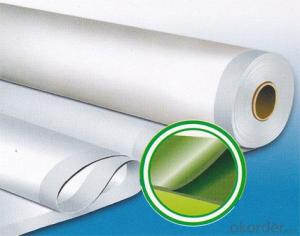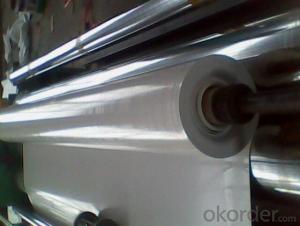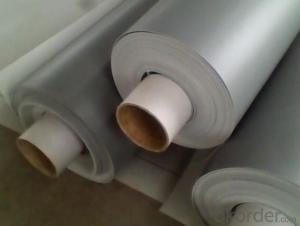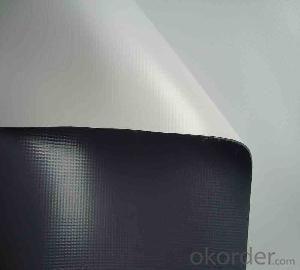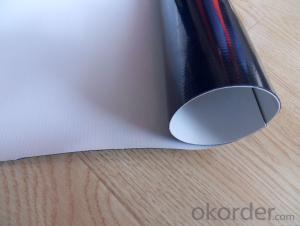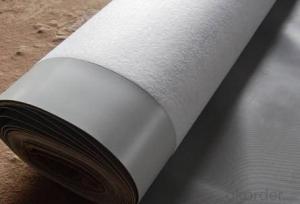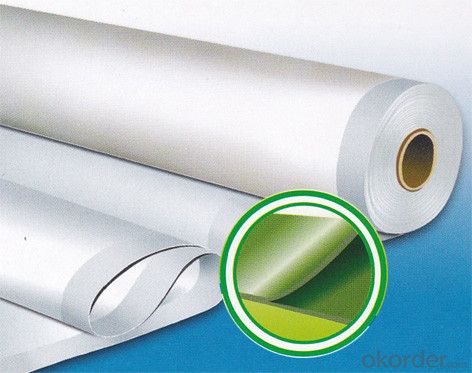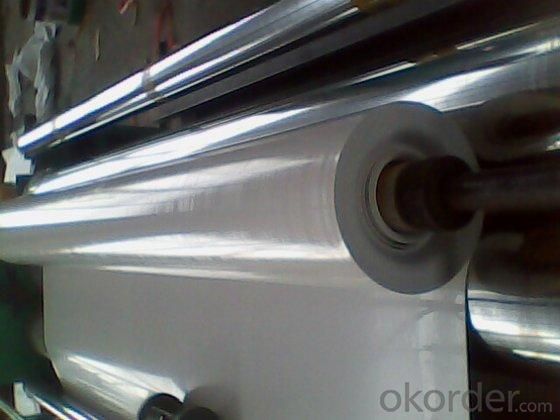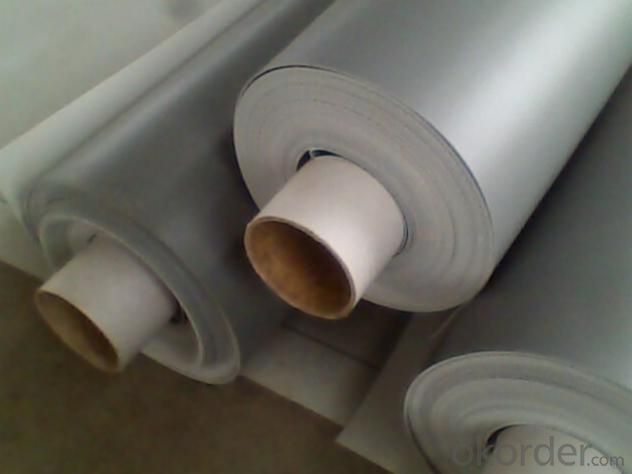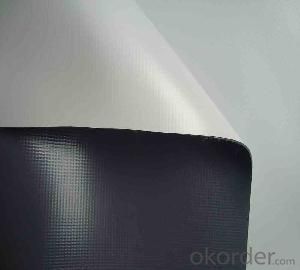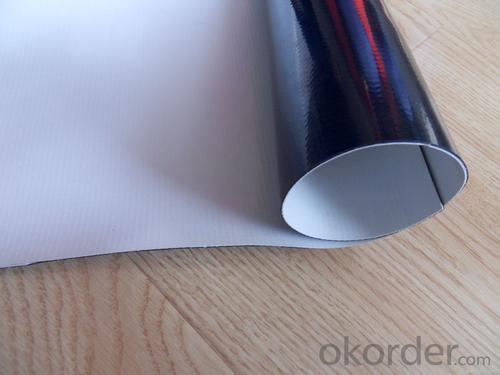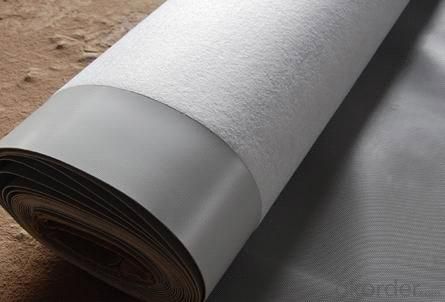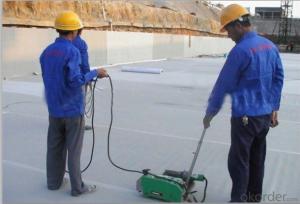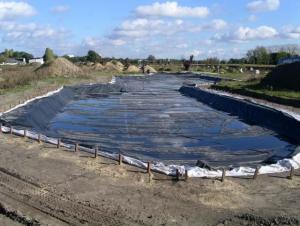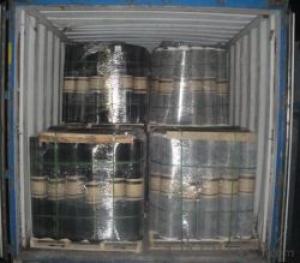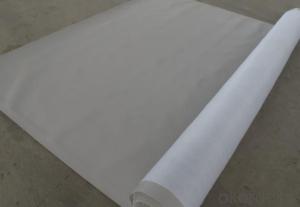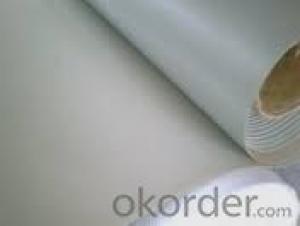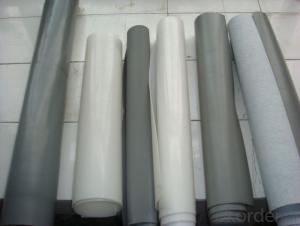PVC Waterproof Membrane in 1.5mm Thickness and Low Price
- Loading Port:
- Shanghai
- Payment Terms:
- TT OR LC
- Min Order Qty:
- 20000 m²
- Supply Capability:
- 5000000 m²/month
OKorder Service Pledge
OKorder Financial Service
You Might Also Like
PVC Waterproof Membrane in 1.5mm Thickness
Product Description of PVC Waterproof Membrane in 1.5mm Thickness:
PVC Membrane Waterproof /Waterproofing membrane For Roof is a new polymer waterproof membrane. The PVC Membrane Waterproof /Waterproofing membrane For Roof raw material is polyvinyl chloride resin, mixed with plasticizer, filler, antioxygen, ultraviolet absorber and other auxiliaries.
Thickness: 1.2mm/1.5mm/1.8mm/2.0mm
Width:2050mm
Length:20m( Special specifications can be customized)
Size: 2.05mx20m
Color: white/grey, or any other colors.
Features of PVC Waterproof Membrane in 1.5mm Thickness:
1. Excellent aging resistance. Service life of roofing material is over 20 years; service life of underground material is over 50 years.
2. Root resistant penetration, specially used on planting roofings.
3. Welding installation. Joints are solid and environment friendly, no pollution.
4. High tensile strength, good elongation and dimensional stability.
5. Good plasticity, easy and suitable for details installation.
6. Fireproof. Fire extinguished out of the ignition resource.
7. Surface is smooth, no fading and dirty resistant.
8. Width is over 2m. Construction wastage is small, more economical.
Classification of PVC Waterproof Membrane in 1.5mm Thickness:
1. N: Homogeneous PVC membrane
2. L: PVC membrane with fabric backing
3. W: Reinforced PVC membrane
Advantage of PVC Waterproof Membrane in 1.5mm Thickness:
1.) Mixing automation. Apply automatic temperature control automatic time control and automatic feed control.
2.) Extrusion equipment uses twin screw coextrusion. Screw temperature uses computer automatic temperature control system.
3.) Handpiece uses large width didhead extrusion equipment.
4.) Sophisticated three-roller calender equipment. The space between equiment is controlled by automation system.
Technical Data of PVC Waterproof Membrane in 1.5mm Thickness:
No. | Item | Model Ⅱ | |
1 | Tensile Strength Mpa ≥ | 12.0 | |
2 | Elongation at break% ≥ | 250 | |
3 | Shrinkage rate % ≤ | 2.0 | |
4 | Flexibility at low temperature | No crackle at -25oC | |
5 | Water tightness | Watertight | |
6 | Puncture resistance | Watertight | |
7 | Heat aging treatment | Appearance | Free from bubble, crack, cohesion and void |
Change rate of tensile strength % | +20oC | ||
Change rate of elongation at break | |||
Flexibility at low temperature | No crack at -20oC | ||
8 | Chemical corrosion resistance | Change rate of tensile strength % | +20 |
Change rate of elongation at break | |||
Flexibility at low temperature | No crack at -20oC | ||
9 | Artificial weathering | Change rate of tensile strength % | +20 |
Change rate of elongation at break | |||
Flexibility at low temperature | No crack at -20oC | ||
Application of PVC Waterproof Membrane in 1.5mm Thickness:
PVC waterproof membrane forms an effective barrier to liquid water or water vapor in the steel structure for industrial and civil engineering, underground engineering, such as subway, bridges , tunnel, water pools, shelter, grain depot, land filling and subwayProducts display.
Images of PVC Waterproof Membrane in 1.5mm Thickness:
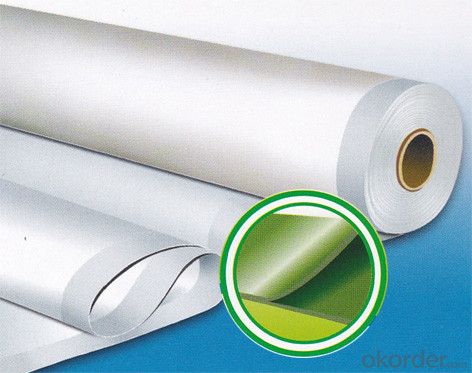
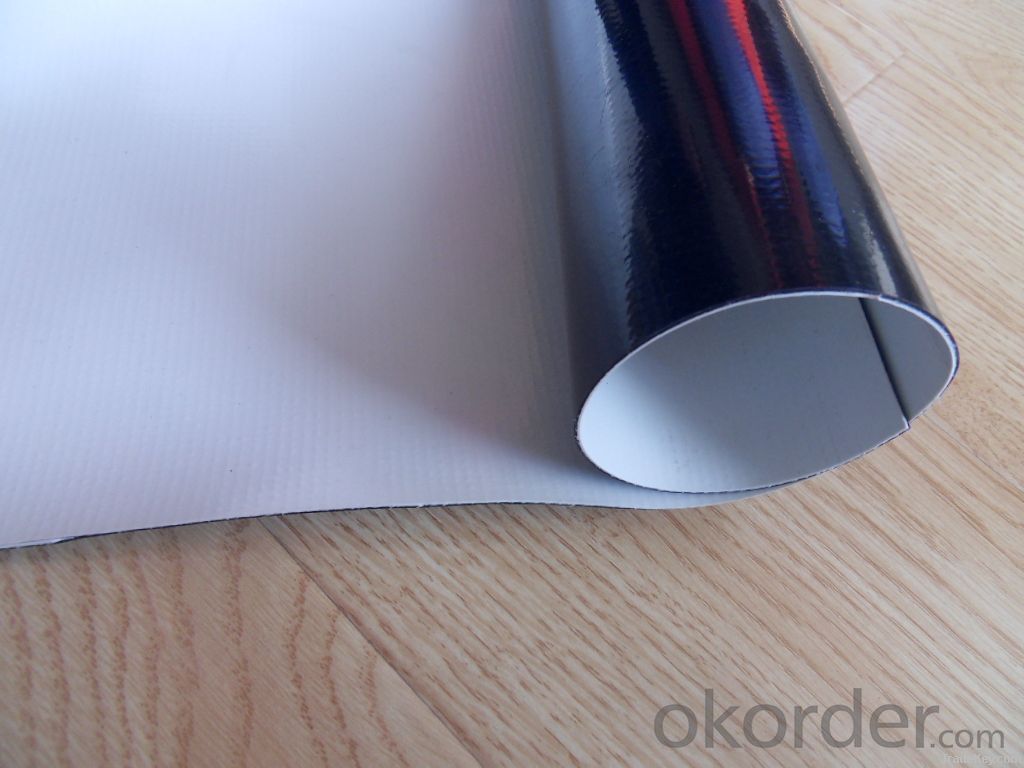
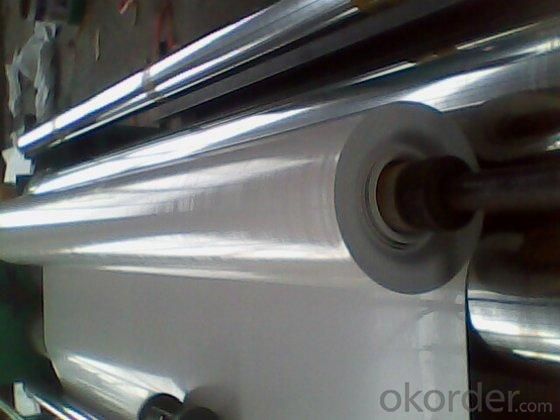
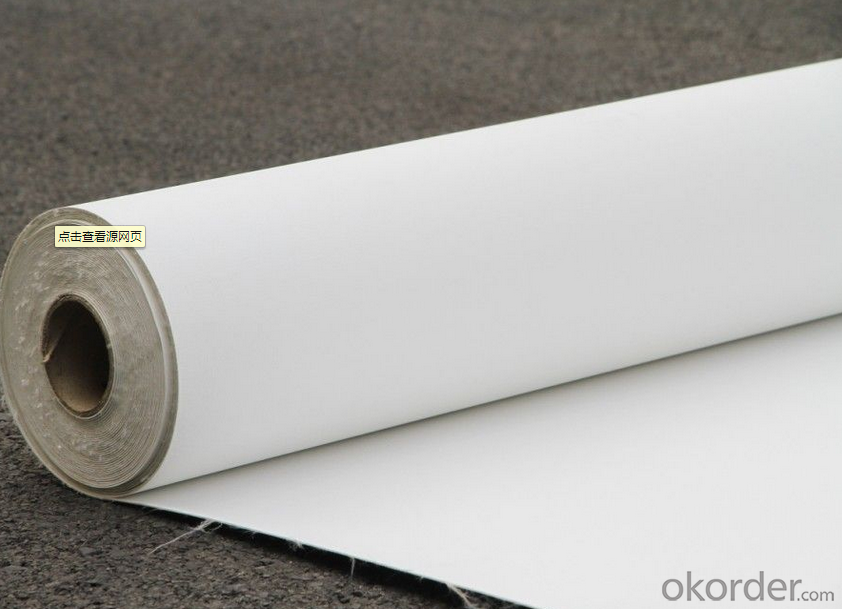
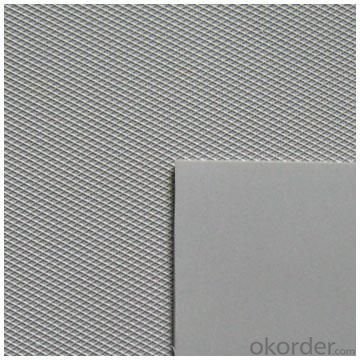
FAQ:
1. Can you produce 4m width?
Yes, no problem for us. We have four bases in China, largest one in this field.
2. How many quantity in one 20'' container for 1.2mm and 1.5mm?
480rolls, 11520m2 for 1.2mm and 400rolls, 9600m2 for 1.5mm
3. Can you provide free samples?
Yes, our samples are free, but express fees usually on buyer's account.
- Q: Can a waterproofing membrane be used in areas with vehicular traffic?
- Certainly! It is indeed possible to utilize a waterproofing membrane in regions frequented by vehicles. In reality, there exist distinct variants of waterproofing membranes meticulously crafted to endure the pressure and motion exerted by automobiles. These specialized membranes, referred to as vehicular or traffic-bearing membranes, are generally composed of sturdier materials like rubberized asphalt or modified bitumen. They are purposefully engineered to furnish a robust and flexible barricade against water and moisture, whilst simultaneously withstanding the burdensome loads and incessant traffic commonly associated with vehicles. Vehicular membranes find widespread application in parking garages, bridges, and other sites where vehicles are commonly found.
- Q: Can a waterproofing membrane be used for bridges?
- Bridges can benefit from the use of a waterproofing membrane. Due to their exposure to harsh weather conditions and constant contact with water, bridges are susceptible to deterioration and structural harm. By applying a waterproofing membrane to the bridge surface, it becomes shielded against water infiltration, preventing the corroding of reinforcing steel and extending the bridge's lifespan. Acting as a barrier, the membrane prevents water from permeating the concrete and causing structural damage. Moreover, it aids in minimizing the negative impact of freeze-thaw cycles, which can further harm the bridge. Furthermore, the waterproofing membrane can enhance the overall durability and performance of the bridge, ultimately reducing maintenance and repair expenses in the long term.
- Q: Is a waterproofing membrane compatible with different types of roofing materials?
- Yes, a waterproofing membrane is compatible with different types of roofing materials. A waterproofing membrane is a versatile solution that can be used on various roofing materials such as asphalt shingles, metal roofs, concrete roofs, and even flat roofs. The membrane is designed to provide a barrier against water penetration, regardless of the type of roofing material. It can be applied directly on the surface of the roof or as an underlayment before installing the roofing material. This compatibility ensures that the waterproofing membrane can be used effectively to protect and extend the lifespan of different types of roofs.
- Q: Can a waterproofing membrane be used for a school?
- Certainly! A school can indeed benefit from the use of a waterproofing membrane. In construction projects, like schools, waterproofing membranes are commonly employed to shield the building and its inhabitants from water damage. These membranes are typically applied to areas like basements, roofs, and foundation walls to prevent water infiltration. By serving as a barrier against moisture, a waterproofing membrane ensures a dry and secure environment within the school, safeguarding against potential structural destruction, mold growth, and other water-related problems. Furthermore, waterproofing membranes often offer supplementary advantages such as insulation and soundproofing, which can contribute to a pleasant and conducive learning atmosphere for students and staff.
- Q: Can waterproofing membranes be used in wet areas like bathrooms?
- Waterproofing membranes are indeed suitable for wet areas such as bathrooms. It is strongly advised to utilize these membranes in bathroom spaces to prevent water damage and leaks. These membranes are specifically designed to form a barrier against moisture, guaranteeing that water does not infiltrate the bathroom's walls, floors, or other surfaces. By applying a waterproofing membrane, you can effectively safeguard the underlying structure from water damage, mold growth, and other issues caused by extended exposure to moisture. This is particularly crucial in wet areas like bathrooms where water is consistently present. Waterproofing membranes can be found in various forms, including sheet membranes, liquid membranes, and even pre-formed shower trays. They can be applied to walls, floors, shower enclosures, and other surfaces to create a tight seal against water. It is essential to correctly install and maintain the waterproofing membrane according to the manufacturer's guidelines to ensure its efficacy and durability. Therefore, if you are contemplating renovating or constructing a bathroom, it is highly recommended to use waterproofing membranes to guarantee a long-lasting and moisture-resistant space.
- Q: Is a waterproofing membrane resistant to saltwater or other corrosive substances?
- Yes, a waterproofing membrane is generally resistant to saltwater and other corrosive substances. Waterproofing membranes are designed to provide a barrier against moisture and water penetration, which includes protection against corrosive substances. These membranes are typically made from materials such as modified bitumen, PVC, EPDM, or TPO, which have inherent resistance to saltwater and other corrosive elements. Additionally, some manufacturers may also incorporate additional protective layers or coatings to enhance the membrane's resistance to corrosive substances. However, it is important to note that the level of resistance can vary depending on the specific type and quality of the waterproofing membrane used. Therefore, it is crucial to choose a high-quality membrane that is specifically designed for the intended application, such as saltwater environments or areas exposed to other corrosive substances.
- Q: What is the cost of installing a waterproofing membrane?
- The installation expense of a waterproofing membrane can fluctuate based on several factors, including the dimensions of the area to be waterproofed, the type of membrane employed, and the intricacy of the installation procedure. Typically, the cost per square foot can vary between $3 and $10. Nevertheless, it is crucial to bear in mind that this is merely a ballpark figure, and the real cost may be higher or lower depending on the particular demands of the project. It is advisable to seek guidance from an expert waterproofing contractor to obtain a precise cost estimate customized to your specific requirements.
- Q: Can a waterproofing membrane be used on precast stone block surfaces?
- Precast stone block surfaces can benefit from the application of a waterproofing membrane. These membranes are frequently utilized to safeguard a variety of surfaces, including precast stone blocks, from water infiltration and moisture harm. The purpose of these membranes is to establish a barrier that prevents water from seeping into the surface and causing problems like mold, decay, or structural deterioration. By applying a waterproofing membrane to precast stone block surfaces, their durability and lifespan can be improved by shielding them from water-related difficulties. However, it is crucial to diligently adhere to the manufacturer's instructions and ensure that the chosen waterproofing membrane is appropriate for the specific type of precast stone block surface being treated.
- Q: Can waterproofing membranes be used on concrete pipes?
- Yes, waterproofing membranes can be used on concrete pipes. These membranes provide a protective barrier against water infiltration, preventing any potential leakage or damage to the concrete pipes.
- Q: What is the accounting subject of the waterproofing membrane
- For external construction, included in the construction Self-service maintenance, included in the manufacturing costs (management costs)
Send your message to us
PVC Waterproof Membrane in 1.5mm Thickness and Low Price
- Loading Port:
- Shanghai
- Payment Terms:
- TT OR LC
- Min Order Qty:
- 20000 m²
- Supply Capability:
- 5000000 m²/month
OKorder Service Pledge
OKorder Financial Service
Similar products
Hot products
Hot Searches
Related keywords
